This article was co-authored by Jennifer Butt, MD. Jennifer Butt, MD, is a board certified Obstetrician and Gynecologist operating her private practice, Upper East Side OB/GYN, in New York City, New York. She is affiliated with Lenox Hill Hospital. She earned a BA in Biological Studies from Rutgers University and an MD from Rutgers – Robert Wood Johnson Medical School. She then completed her residency in obstetrics and gynecology at Robert Wood Johnson University Hospital. Dr. Butt is board certified by the American Board of Obstetrics and Gynecology. She is a Fellow of the American College of Obstetricians and Gynecologists and a member of the American Medical Association.
There are 10 references cited in this article, which can be found at the bottom of the page.
wikiHow marks an article as reader-approved once it receives enough positive feedback. This article received 41 testimonials and 80% of readers who voted found it helpful, earning it our reader-approved status.
This article has been viewed 3,628,421 times.
During the first two weeks of pregnancy, it can be difficult to determine whether you're pregnant. Signs may be subtle. However, if you notice any unusual changes, you may be pregnant. Taking a home pregnancy test may confirm your suspicions, but the surest way to know is to see a doctor.
Steps
Noticing Changes in Mood and Energy
-
1
-
2Take note of any changes in tastes. You may not experience food cravings right away. However, early on in pregnancy you may suddenly develop an aversion to certain foods.[3] You may dislike the smell of a food or drink you once enjoyed or did not mind.[4]Advertisement
-
3Think about whether you've been moody. Pregnancy hormones can cause changes in mood early on. You may notice you get angry or frustrated more easily or are very emotional. You may cry over sad commercials or television shows more easily.[5]
- These mood swings may be similar to what you experience just before your menstrual cycle.
Paying Attention to Physical Changes
-
1
-
2
-
3Note unusual bleeding or spotting. Implantation bleeding sometimes occurs just after pregnancy, possibly due to a sperm attaching to an egg. Some women may mistake this for a very light period, but it can be a sign of pregnancy if you are also experiencing other symptoms.[10]
- Implantation bleeding or spotting is much lighter than your regular period. You may only notice it when you wipe.
- The color also may differ from a regular period. It may be more pink or brown-colored than usual.
-
4Evaluate if you have unusual aches and pains. Pregnancy can cause unexpected physical discomfort. Usually, this takes the form of mild uterine cramping as well as tender, sore breasts.[11]
- Like many symptoms of pregnancy, these are often similar to pains you may experience just before your period.
-
5Look for changes in urination habits. During pregnancy, your kidneys produce extra fluid due to increased levels of blood in your body. Many women notice increased urination during pregnancy. If you find yourself using the bathroom more often, this could be an early sign that you are pregnant.[12]
- Just after you become pregnant, it's normal for your body to produce up to 25% more urine. The increase in urine will peak at 10-15 weeks of pregnancy. After that, you'll likely feel increased urges to urinate, as the additional weight of your uterus and growing baby press down on your bladder.
-
6Notice breast tenderness. Breast tissue is very sensitive to your hormones, so your breasts will show signs of pregnancy early. You may start to experience tender, swollen breasts as early as 2 weeks after conception.[13] It's normal to feel a tingly sensation and soreness.
- Your breasts may also start to fill full and heavy.[14]
Seeking Medical Evaluation
-
1Take a home pregnancy test. If you suspect you are pregnant, pick up a home pregnancy test at a drug store. Follow the directions on the package and take the test at home. Usually, you pee on the stick or gather your urine in a cup and dip the stick in the test.[15]
- The best time to take a home pregnancy test is in the morning when your levels of the hormone HCG are highest.
- Most pregnancies tests can be taken a few days after your missed period. However, there are some tests on the market designed for early detection, like e.p.t., that you can try. Refer to the package's instructions for precise directions on when to take the test.[16]
- Tests are more accurate after your missed period. If you suspect you are pregnant before missing your period, go to the doctor instead of taking an at home test.
-
2Make an appointment with your healthcare provider. If you suspect you are pregnant, or have a positive pregnancy test, make an appointment with your doctor.[17]
- During your first visit, your doctor will run tests to confirm your pregnancy. A doctor may perform a urine test in the office or they may order blood work.[18]
- Your doctor will also ask you about your medical history, past pregnancies, your general lifestyle, and any medications you're currently taking.
- Your doctor will perform a basic physical exam to make sure you're in good health.
-
3Seek support. If you are pregnant, it can be an emotional experience. Waiting on the results of a test can be stressful, so talk to friends, family members, and the other parent about your emotions. You can also talk to a therapist if you have one.
Expert Q&A
-
QuestionWhat are some common myths of signs you're pregnant?
 Jennifer Butt, MDJennifer Butt, MD, is a board certified Obstetrician and Gynecologist operating her private practice, Upper East Side OB/GYN, in New York City, New York. She is affiliated with Lenox Hill Hospital. She earned a BA in Biological Studies from Rutgers University and an MD from Rutgers – Robert Wood Johnson Medical School. She then completed her residency in obstetrics and gynecology at Robert Wood Johnson University Hospital. Dr. Butt is board certified by the American Board of Obstetrics and Gynecology. She is a Fellow of the American College of Obstetricians and Gynecologists and a member of the American Medical Association.
Jennifer Butt, MDJennifer Butt, MD, is a board certified Obstetrician and Gynecologist operating her private practice, Upper East Side OB/GYN, in New York City, New York. She is affiliated with Lenox Hill Hospital. She earned a BA in Biological Studies from Rutgers University and an MD from Rutgers – Robert Wood Johnson Medical School. She then completed her residency in obstetrics and gynecology at Robert Wood Johnson University Hospital. Dr. Butt is board certified by the American Board of Obstetrics and Gynecology. She is a Fellow of the American College of Obstetricians and Gynecologists and a member of the American Medical Association.
Board Certified Obstetrician & Gynecologist
-
QuestionWhat are some unusual signs of early pregnancy?
 Jennifer Butt, MDJennifer Butt, MD, is a board certified Obstetrician and Gynecologist operating her private practice, Upper East Side OB/GYN, in New York City, New York. She is affiliated with Lenox Hill Hospital. She earned a BA in Biological Studies from Rutgers University and an MD from Rutgers – Robert Wood Johnson Medical School. She then completed her residency in obstetrics and gynecology at Robert Wood Johnson University Hospital. Dr. Butt is board certified by the American Board of Obstetrics and Gynecology. She is a Fellow of the American College of Obstetricians and Gynecologists and a member of the American Medical Association.
Jennifer Butt, MDJennifer Butt, MD, is a board certified Obstetrician and Gynecologist operating her private practice, Upper East Side OB/GYN, in New York City, New York. She is affiliated with Lenox Hill Hospital. She earned a BA in Biological Studies from Rutgers University and an MD from Rutgers – Robert Wood Johnson Medical School. She then completed her residency in obstetrics and gynecology at Robert Wood Johnson University Hospital. Dr. Butt is board certified by the American Board of Obstetrics and Gynecology. She is a Fellow of the American College of Obstetricians and Gynecologists and a member of the American Medical Association.
Board Certified Obstetrician & Gynecologist Your tastes might change. For example, you may normally think, “I love eating salad and vegetables and everything like that,” and all of a sudden, the sight of a salad or lettuce is really unappetizing.
Your tastes might change. For example, you may normally think, “I love eating salad and vegetables and everything like that,” and all of a sudden, the sight of a salad or lettuce is really unappetizing. -
QuestionWhat are the early signs of pregnancy?
 Jennifer Butt, MDJennifer Butt, MD, is a board certified Obstetrician and Gynecologist operating her private practice, Upper East Side OB/GYN, in New York City, New York. She is affiliated with Lenox Hill Hospital. She earned a BA in Biological Studies from Rutgers University and an MD from Rutgers – Robert Wood Johnson Medical School. She then completed her residency in obstetrics and gynecology at Robert Wood Johnson University Hospital. Dr. Butt is board certified by the American Board of Obstetrics and Gynecology. She is a Fellow of the American College of Obstetricians and Gynecologists and a member of the American Medical Association.
Jennifer Butt, MDJennifer Butt, MD, is a board certified Obstetrician and Gynecologist operating her private practice, Upper East Side OB/GYN, in New York City, New York. She is affiliated with Lenox Hill Hospital. She earned a BA in Biological Studies from Rutgers University and an MD from Rutgers – Robert Wood Johnson Medical School. She then completed her residency in obstetrics and gynecology at Robert Wood Johnson University Hospital. Dr. Butt is board certified by the American Board of Obstetrics and Gynecology. She is a Fellow of the American College of Obstetricians and Gynecologists and a member of the American Medical Association.
Board Certified Obstetrician & Gynecologist If somebody misses their period or is late, it could be a pregnancy. Other common symptoms are nausea, food aversions, and tiredness.
If somebody misses their period or is late, it could be a pregnancy. Other common symptoms are nausea, food aversions, and tiredness.
Warnings
- A very small percentage of women continue menstruating throughout the course of their pregnancy; having your period does not mean that you're not pregnant in all cases. You should take a test if you suspect you are pregnant.⧼thumbs_response⧽
References
- ↑ Jennifer Butt, MD. Board Certified Obstetrician & Gynecologist. Expert Interview. 13 March 2020.
- ↑ http://www.mayoclinic.org/healthy-lifestyle/getting-pregnant/in-depth/symptoms-of-pregnancy/art-20043853
- ↑ Jennifer Butt, MD. Board Certified Obstetrician & Gynecologist. Expert Interview. 13 March 2020.
- ↑ http://www.mayoclinic.org/healthy-lifestyle/getting-pregnant/in-depth/symptoms-of-pregnancy/art-20043853?pg=2
- ↑ http://www.mayoclinic.org/healthy-lifestyle/getting-pregnant/in-depth/symptoms-of-pregnancy/art-20043853?pg=2
- ↑ Jennifer Butt, MD. Board Certified Obstetrician & Gynecologist. Expert Interview. 13 March 2020.
- ↑ http://americanpregnancy.org/getting-pregnant/early-pregnancy-symptoms/
- ↑ Jennifer Butt, MD. Board Certified Obstetrician & Gynecologist. Expert Interview. 13 March 2020.
- ↑ http://americanpregnancy.org/getting-pregnant/early-pregnancy-symptoms/
- ↑ http://www.babycentre.co.uk/a25007925/pregnancy-signs-at-two-weeks
- ↑ http://www.mayoclinic.org/healthy-lifestyle/getting-pregnant/in-depth/symptoms-of-pregnancy/art-20043853?pg=2
- ↑ http://www.mayoclinic.org/healthy-lifestyle/getting-pregnant/in-depth/symptoms-of-pregnancy/art-20043853?pg=1
- ↑ Jennifer Butt, MD. Board Certified Obstetrician & Gynecologist. Expert Interview. 13 March 2020.
- ↑ https://www.parents.com/pregnancy/signs/symptoms/signs-you-may-be-pregnant/
- ↑ http://www.mayoclinic.org/healthy-lifestyle/getting-pregnant/in-depth/symptoms-of-pregnancy/art-20043853?pg=2
- ↑ https://www.plannedparenthood.org/learn/pregnancy/pregnancy-test
- ↑ http://www.mayoclinic.org/healthy-lifestyle/pregnancy-week-by-week/in-depth/prenatal-care/art-20044882
- ↑ http://americanpregnancy.org/getting-pregnant/understanding-pregnancy-tests/
- ↑ Jennifer Butt, MD. Board Certified Obstetrician & Gynecologist. Expert Interview. 13 March 2020.
About This Article
It can be hard to know if you’re pregnant during the first few weeks, but there are some early signs you can watch for. A common early sign of pregnancy is a lack of overall energy, even when you haven’t changed your routine or sleep schedule. You may also notice that you have an aversion to certain foods or drinks or that you don’t like the smell of things you previously enjoyed. Pregnancy hormones can trigger changes in mood early on, so notice if you get angry or frustrated more quickly or if you find yourself crying more easily. Another early sign of pregnancy is mild uterine cramping or tender breasts, though these, like many other signs, can also be experienced just before your period. If you suspect you’re pregnant, pick up a home pregnancy test and take it in the morning when your hormone levels are at their highest. If you get a positive, make an appointment with your doctor to confirm your pregnancy. For more tips from our Medical co-author, including how to tell the difference between implantation bleeding and a light period, keep reading!




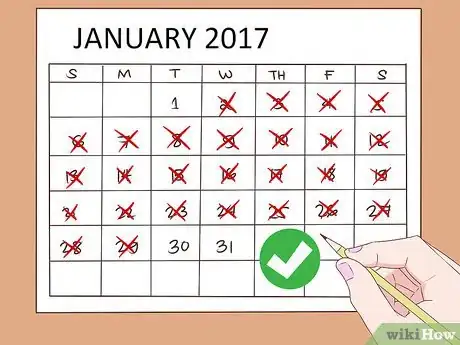

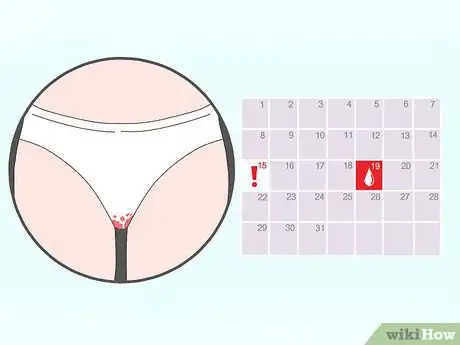



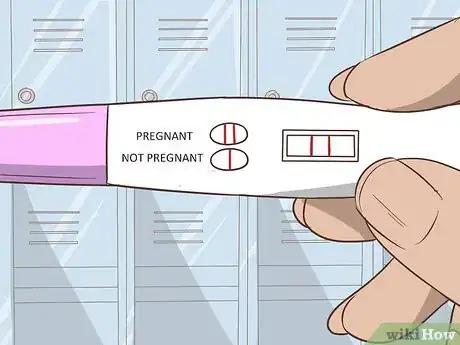


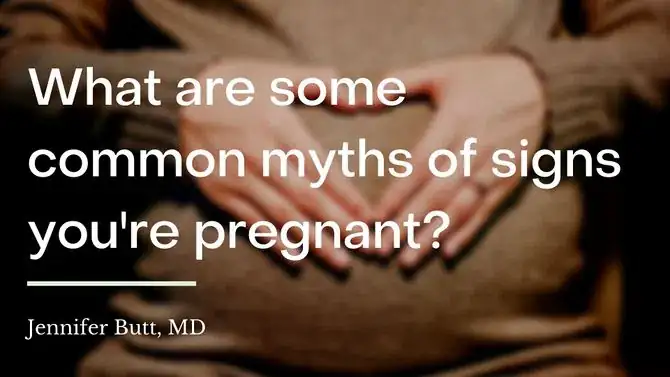




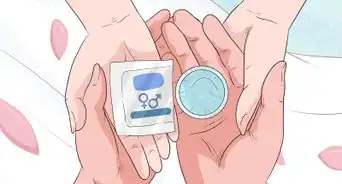
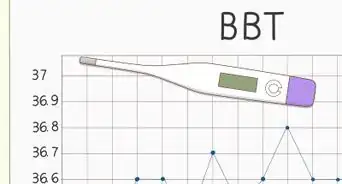


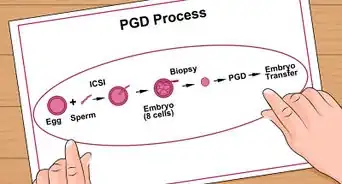






















































Medical Disclaimer
The content of this article is not intended to be a substitute for professional medical advice, examination, diagnosis, or treatment. You should always contact your doctor or other qualified healthcare professional before starting, changing, or stopping any kind of health treatment.
Read More...